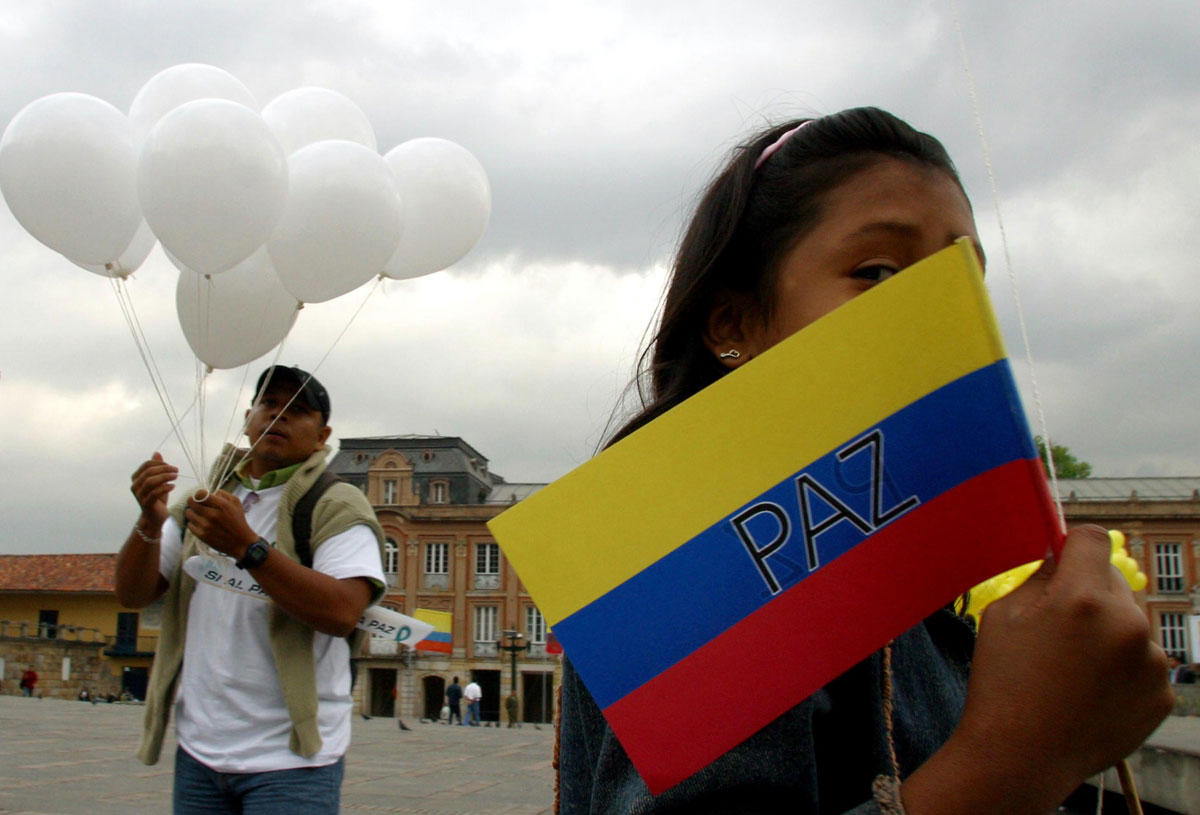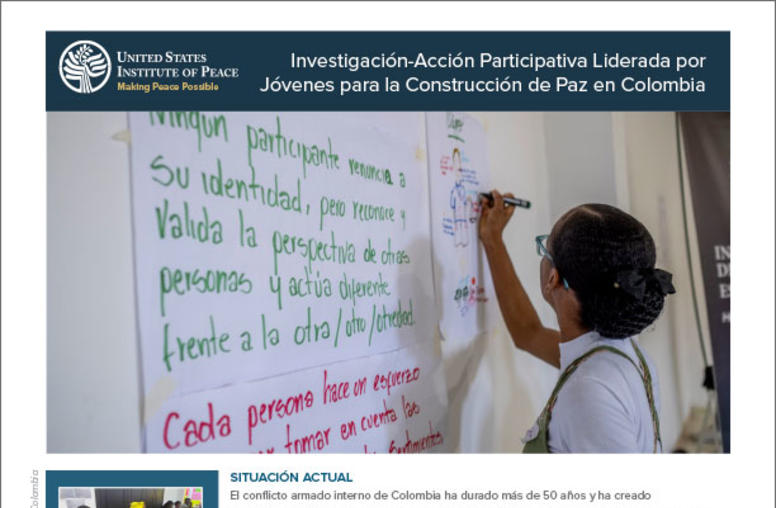USIP’s Virginia Bouvier and Susan Hayward recently traveled to Colombia in order to strengthen the connection between religion, women and peace. This "In the Field" is an account of their trip.

In early August, we participated in the third national encounter of Ecumenical Women Peacebuilders on a farm in Santandercito just a few hours outside of Bogota. Leaving Bogota at 8 am Saturday morning, our bus rode through winding hills, stopping briefly for us to marvel at the 515-foot Salto del Tequendama—a gorgeous waterfall that cascades into the Bogota River.
We accompanied some 50 peace leaders from 10 regions of Colombia who gathered over three days to discuss future directions for their work. The Ecumenical Women Peacebuilders network began four years ago to stimulate and support dialogue and joint actions between Catholic and Protestant women who work for peace within their distinct institutions. Susan Hayward from USIP’s Religion and Peacebuilding program helped this network get off the ground and take shape with the close consultation of USIP Colombia expert Virginia Bouvier. The dual objectives of this network are to strengthen ecumenical relationships for the purpose of collaborative peacebuilding efforts, and to empower the distinct role of women in religious peacebuilding.
The purpose of the three-day meeting was to review the network’s experiences of ecumenical relationship-building in Colombia and its efforts to direct those relationships toward joint peacebuilding initiatives, and to envision future directions for the network. Speakers at the meeting reviewed concepts of women’s leadership and ecumenism in their religious traditions, the movement for women’s empowerment and rights in Colombia, and peacebuilding needs and initiatives. While the feminist movement in Colombia has historically comprised women outside religious institutions, a presenter from this sector spoke about the crucial need for religiously-minded and secular-minded women to collaborate on joint concerns impacting women.
As part of the program, Susan offered a presentation of USIP-supported interfaith efforts to reduce violence and contribute to reconciliation in Iraq, Nigeria, and Sri Lanka – highlighting the distinct role played by religious actors and institutions in peacebuilding. Susan also discussed the peacebuilding work of Christian and Muslim women in Liberia, led by Nobel Peace Prize winner Leymah Gbowee, which successfully contributed to ending its civil war. The Colombian women found the example of the Liberian women particularly inspiring. The participants expressed a clear interest in building on the facilitated interfaith dialogue training USIP provided to them in 2010 as a means to strengthen platforms for peacebuilding work.
Virginia presented on the larger context of peace efforts in Colombia within which the work of the ecumenical women peacebuilders fits. Bouvier discussed the evolution in the last two decades toward a concept of peacebuilding as a long-term process for violence prevention, and described a myriad of peace initiatives she has seen and USIP has supported in Colombia. Finally, Bouvier analyzed the characteristics shared by more successful initiatives.
In small groups and in the plenary, participants reflected on these and other presentations. They discussed the challenges they face in doing ecumenical peacebuilding in their regions and related the presentations to their own peacebuilding strategies. By the conclusion of the workshop, the participants from each region had made concrete commitments for collective joint action over the next year.
Ecumenism a Challenge
Although the Colombian conflict is not based on religious divisions, the depth of the historical divide between Catholics and Protestants and the resistance to ecumenism in Colombian society is profound. The meetings these women have had over the last four years have repeatedly surfaced the fear of ecumenism. A Catholic woman who had just joined the network recounted her priest’s warnings to be wary of Protestants’ proselytization efforts and to research ecumenism carefully before attending the retreat. A Baptist minister at the meeting was recently elected president of the women in her church. She observed that her church had largely avoided socio-political issues in order to focus on individual spirituality, but that after last year’s ecumenical women’s retreat she decided to make the issue of peace the top priority for her two-year term in office. She said that she thought it would be better to start with an “easy” topic (such as peace) and to hold off addressing the more difficult issue of ecumenism until later.
The challenge of ecumenism has a negative impact on peacebuilding efforts in Colombia. This challenge is reflective of civil society at large in Colombia, which is often fragmented by competing interests or historical tensions. The hope of the women involved in this ecumenical network of peacebuilders is to heal the rift between Catholic and Protestant women for the purpose of advancing larger scale efforts to build peace that capitalize on the individual strengths of Catholic and Protestant approaches.
Role of Ritual and Creativity
Prayer, ceremonies, performance, crafts, songs, games, interpretative and relaxation exercises, and poetry permeated the encounter in Santandercito and underscored the commonalities shared by these women — their gender, their engagement in peacebuilding, and their identities as women of faith. If ritual created common bonds among the women, creative expression enabled participants to recognize and appreciate both individual and group differences among themselves. Such rituals and exercises of creative expression contributed to building trust and helped to strengthen bonds among the participants.
Enhancing Strategies for Peace
We have a great deal of hope about initiatives such as the Ecumenical Women’s Peacebuilding network in Colombia. Over four years, this network has built a safe space where women can collectively reflect on their faith and develop strategies for participation in peace work that builds on their common identity as ecumenical women of faith. A deeper understanding of what each of them and their communities are doing in their different regions is an important step toward defining how they might join forces for more effect and greater impact. Throughout the three days, myriad examples of the impact of this network were cited – in stories about joint peacebuilding projects that have blossomed in various regions, in the resolution of conflicts between Catholic and Protestant communities and families by members of the network, about the initiation of dialogue between churches that have historically had no relationship in rural areas, and about the de-escalation of biased rhetoric between the communities. Documenting such examples of the network’s impact is key to ensuring that the important efforts of these religious women peacebuilders, a group that has often been rendered invisible, are not overlooked in the history of peacebuilding in Colombia.


